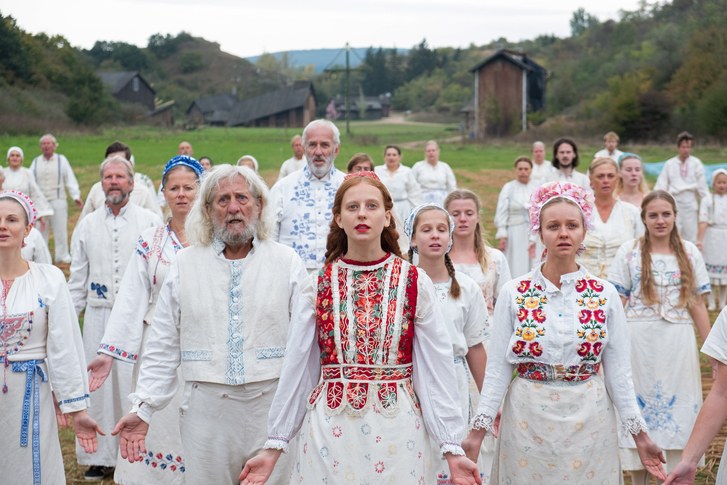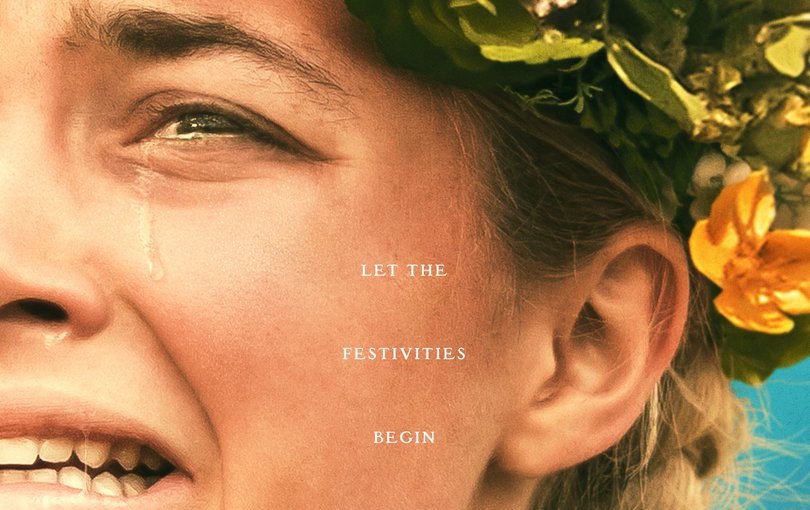
The notion of folk horror – of isolated communities, barbaric practices and something distinctly sinister about the land itself – has received an awful lot of critical attention in the past few years, not least of which from this very site, so it’s unsurprising to see new films are now appearing, borne out of that renewed interest no doubt. Ari Aster is a filmmaker very much on the up, given his success with last year’s Hereditary; it was a film which very nearly became a victim of its own reputation. I was one of the people who went in with expectations that a film with a very dark, bleak name for itself would be even darker and bleaker than it was; the moments of high farce threw me a little. There is no such confusion with Midsommar, a film which splices its incredibly graphic gore and creeping horror with overblown, definitely-allowed-to-laugh sequences. For all of that, it’s still an effective horror story, possibly because it allows itself to toy with its characters (and its audience) so effectively, its folk horror moving from quaint to bizarre to gratuitous. None of this would hit home so effectively, however, without the strong characterisation of those thrown into the midst of all this.
Dani (Lady Macbeth’s Florence Pugh) is a troubled young woman whose relationship with boyfriend Christian (Jack Reynor) is very clearly in a death rattle: the more she clings, and calls him, and waits for him to ask how she is, then passive-aggressively makes him ask how she is, the more he pulls away – towards weed, towards his friends, towards anything he can find, whilst those close to him tell him to finally cut the cord after a solid year of wanting out. Meanwhile her friends tell her he isn’t giving her the support she needs (there’s a nebulous modern word!) therefore she should let him go; friends on both sides seem utterly correct. And perhaps, perhaps these two were at the stage of taking this advice, when the unthinkable happens. A family tragedy lands Dani with a horrific bereavement, and so who can she turn to? Christian, who has to set his misgivings aside. They stay together. The months pass. What’s more, that tang of guilt compelling him to do his best leads him to invite Dani along on a trip to Sweden that summer, something that leaves his friends Mark (Will Poulter), Swedish boy Pelle (Vilhelm Blongren) and Josh (William Jackson Harper) none too impressed. Josh is hoping to travel to Pelle’s old closed community in Halsingland in order to study their very secretive midsummer rituals for his thesis. The idea of a mildly disturbed girlfriend tagging along to whine and cockblock doesn’t really fit what they had in mind.

All the same, they all travel to the remote reaches of Sweden, where en route to the settlement proper Pelle introduces them to some of the other young Harga who have been travelling elsewhere in the world. The Harga believe that one’s life falls into four neat stages, and it’s encouraged for the young to voyage abroad before returning to the community. At this juncture, the film has adequately established its aesthetic and its modus operandi. Are rural Swedes all clad in embroidery and off their nuts on shrooms? Maybe not, which is a shame, but here they are, and the hallucinatory scenes which punctuate this film are very well-observed indeed, melding humour with subtle, but nonetheless affecting hallucinations which, for Dani, turn sour remarkably fast under the weight of her still raw grief. The stage has very much been set: the waiting Harga elders are welcoming, prone to the odd mind-altering substance, oh and fiercely protective of their way of life – understandably so, as they enjoy a rural idyll in the summer, where every meal and gesture seems to have a covert ritual significance.
That all said, this is folk horror: if the rituals didn’t turn steadily more and more sinister, where would we be? The unabashed, slightly crude depictions of sex and sacrifice are one thing and the visiting Americans can just about handle them, but a certain group ritual assures the visitors that these people are not just going through the motions. With a tranquil, but suitable pace, Dani and the other outsiders grow steadily afraid of their new neighbours. Woven into all of this are intimations that, yes, this may all seem strange to outsiders, but what’s the alternative? No family? No one to love? A lonely death? The Harga take their community spirit to at times laughable extremes, even voicing the same words and screams at the same time, but the point is made pretty clear: they are united. And it’s their unity which makes them an unstoppable force.
Whilst these elements will draw pretty basic comparisons to The Wicker Man, Midsommar is far more unlike the 1973 film than like it, in this reviewer’s opinion. Sure, we have the staples of a closed community and their unchristian behaviour, but from the colour palate to the rituals themselves, the differences are abundant. This is no community being exploited by a charming outsider like Lord Summerisle; this is a community where the elders are very much the bedrock of the practices which take place. Unlike Howie, there’s a group of outsiders here, all of whom have significantly different motivations for being present – motivations which change and blur, whilst dear old Sergeant Howie’s aims stay dutifully the same. In fact, one of the film’s great strengths is that my sympathies for various characters shift throughout; those which irk me to begin with, take on a different significance as they try to make sense of the new, barbaric and beautiful world which subsumes them. The closing reels for me were absolutely perfect.
Life in Halsingland is the definition of ‘ridiculous to sublime’; Aster has referred to Midsommar as his ‘break-up film’, and in actual fact it is both of those things in abundance – a series of personal journeys set against a shocking, horrific, and yet pleasantly rustic backdrop, where a relationship finally fucks up in glorious technicolour. No one could ask for violence and terror to be any prettier, nor for a more carefully-constructed, engrossing and, yes, original piece of filmmaking.
